

View Forum - Mortgage Lender Implode-O. Examining the Society of Mind. To appear in the journal Computing and Informatics.
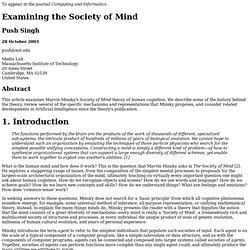
Push Singh 28 October 2003 push@mit.edu Media Lab Massachusetts Institute of Technology 20 Ames Street Cambridge, MA 02139 United States Abstract. Translational research. Translational research is engineering research that helps to make findings from basic science useful for practical applications that enhance human health and well-being.
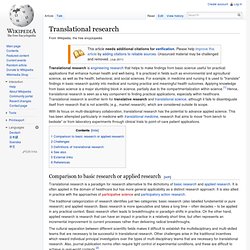
It is practiced in fields such as environmental and agricultural science, as well as the health, behavioral, and social sciences. For example, in medicine and nursing it is used to "translate" findings in basic research quickly into medical and nursing practice and meaningful health outcomes. Applying knowledge from basic science is a major stumbling block in science, partially due to the compartmentalization within science.[1] Hence, translational research is seen as a key component to finding practical applications, especially within healthcare. Translational Research - Overview. Publications. Study shows ways to help Latin American youth. Key features of community programs to help marginalized youth and young adults successfully transition to adulthood include mentoring and opportunities for work and leadership roles, according to a Cornell study in Latin America.
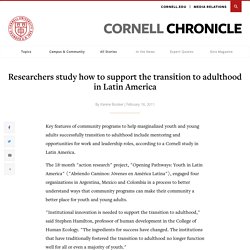
The 18-month "action research" project, "Opening Pathways: Youth in Latin America" ("Abriendo Caminos: Jóvenes en América Latina"), engaged four organizations in Argentina, Mexico and Colombia in a process to better understand ways that community programs can make their community a better place for youth and young adults. "Institutional innovation is needed to support the transition to adulthood," said Stephen Hamilton, professor of human development in the College of Human Ecology. "The ingredients for success have changed. The institutions that have traditionally fostered the transition to adulthood no longer function well for all or even a majority of youth. " James P. Comer, MD, MPH > Comer School Development Program. Dr.
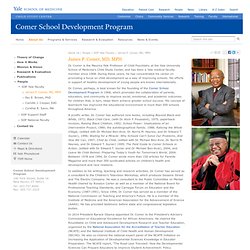
Comer is the Maurice Falk Professor of Child Psychiatry at the Yale University School of Medicine's Child Study Center, and has been a Yale medical faculty member since 1968. Urie Bronfenbrenner. Urie Bronfenbrenner (29 April 1917 – 25 September 2005)[1] was an American developmental psychologist—but born in the Soviet Union[1]—who is most known for his Ecological systems theory of child development.[2] His scientific work and his assistance to the United States government helped in the formation of the Head Start program in 1965.[3] Bronfenbrenner's research and his theory was key in changing the perspective of developmental psychology by calling attention to the large number of environmental and societal influences on child development.[3] Biography[edit] Bronfenbrenner was born in Moscow on April 29, 1917.[1] When he was six, his family moved to the United States, first to Pittsburgh Pennsylvania, and then a year later to a rural part New York state. [4] His father worked as a neuropathologist at a hospital for the developmentally disabled called Letchworth Village, located in Rockland County, N.Y.
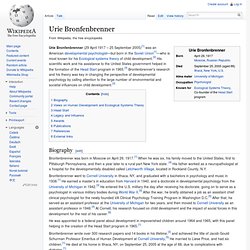
Making Human Beings Human: Bioecological Perspectives on Human Development (The SAGE Program on Applied Developmental Science) (9780761927129): Dr. Urie Bronfenbrenner. Customer Reviews: Mind in Society: The Development of Higher Psychological Processes. IU Bloomington: The Fluid Analogies Research Group was launched roughly 30 years ago with the Seek-Whence, Jumbo, and Copycat projects, the goals of which were (and still are) to make accurate computational models of the most fundamental mechanisms of human thought.
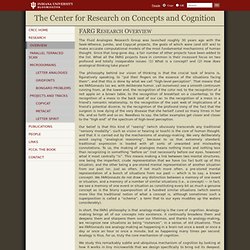
Since that long-gone day, a fair number of other projects have been added to the list. What all the FARG projects have in common is their incessant focus on two profound and totally inseparable issues: (1) What is a concept? And (2) How does analogical thinking take place? The philosophy behind our vision of thinking is that the crucial task of brains is, figuratively speaking, to “put their fingers on the essence of the situations facing them”, and that this is done by what we call “high-level perception”.
Paper: Critical Thinking and Analogical Thinking: A Model. Michel Foucault. Born in Poitiers, France to an upper-middle-class family, Foucault was educated at the Lycée Henri-IV and then the École Normale Supérieure, where he developed an interest in philosophy and came under the influence of his tutors Jean Hyppolite and Louis Althusser.
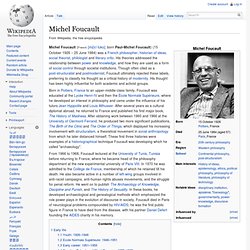
After several years as a cultural diplomat abroad, he returned to France and published his first major book, The History of Madness. After obtaining work between 1960 and 1966 at the University of Clermont-Ferrand, he produced two more significant publications, The Birth of the Clinic and The Order of Things, which displayed his increasing involvement with structuralism, a theoretical movement in social anthropology from which he later distanced himself. These first three histories were examples of a historiographical technique Foucault was developing which he called "archaeology".
Early life[edit] GoalsGuy - Goal-Setting, Personal Development, Motivational Self Help. BRMIC_2003_insight_norms.pdf (application/pdf Object) Covering technological, scientific, and cultural t. Will We Eventually Upload Our Minds? Surfdaddy Orca September 9, 2009 Bruce Katz received his Ph.D. in artificial intelligence from University of Illinois.
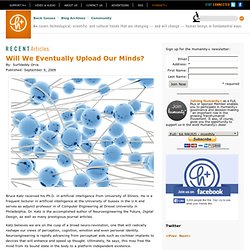
He is a frequent lecturer in artificial intelligence at the University of Sussex in the U.K and serves as adjunct professor in of Computer Engineering at Drexel University in Philadelphia. Dr. Katz is the accomplished author of Neuroengineering the Future, Digital Design, as well as many prestigious journal articles. Ending Aging: The Rejuvenation ...